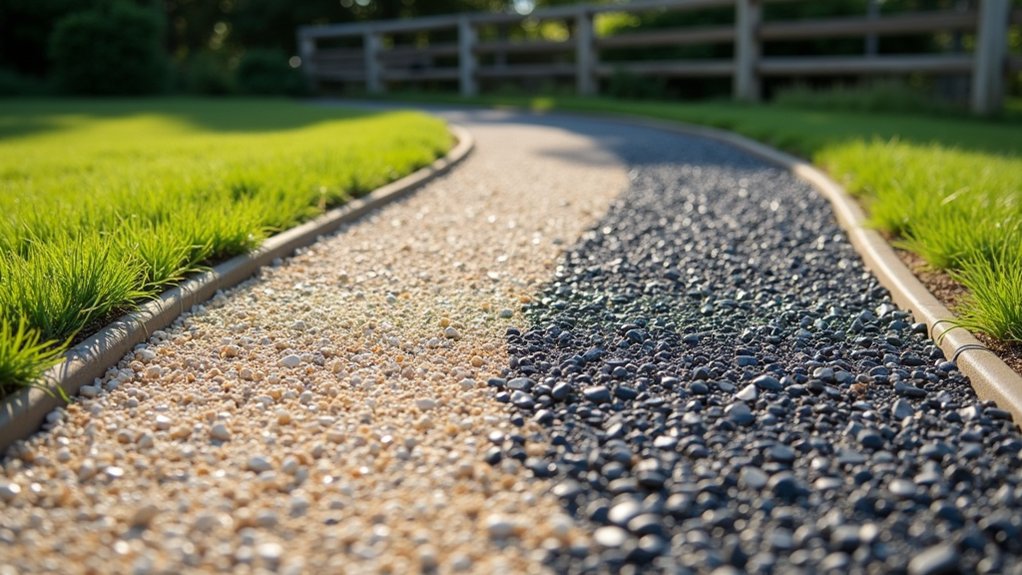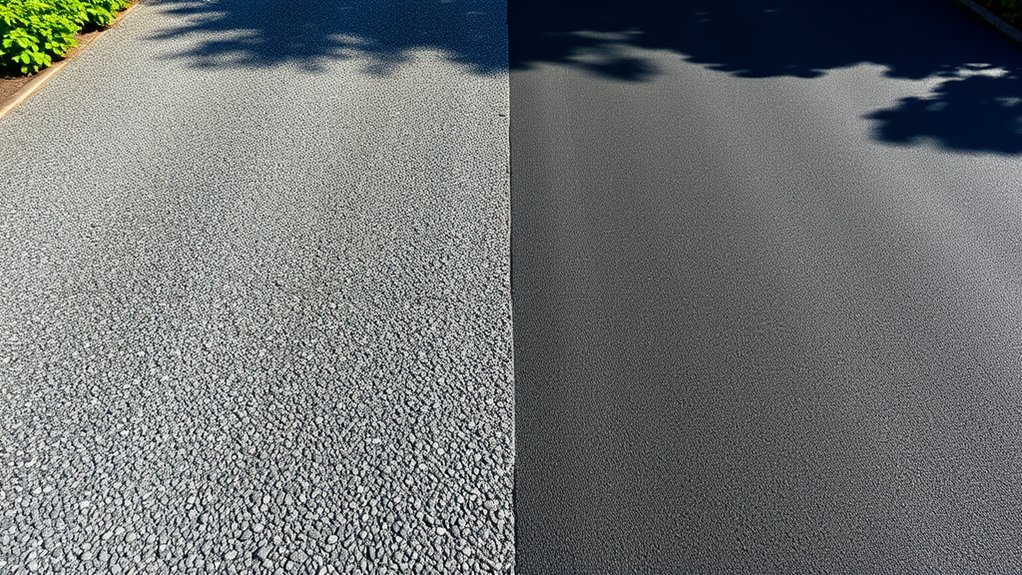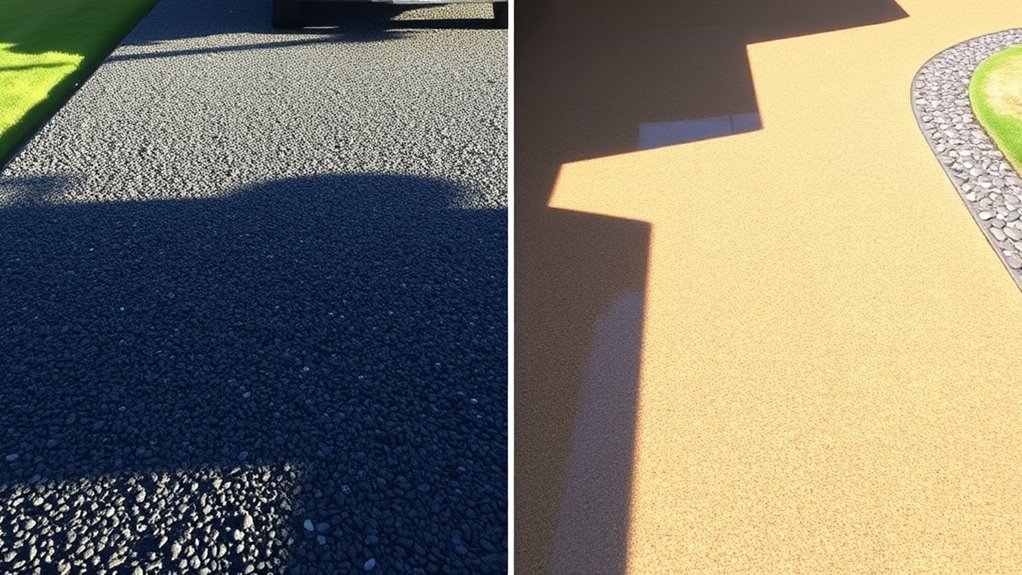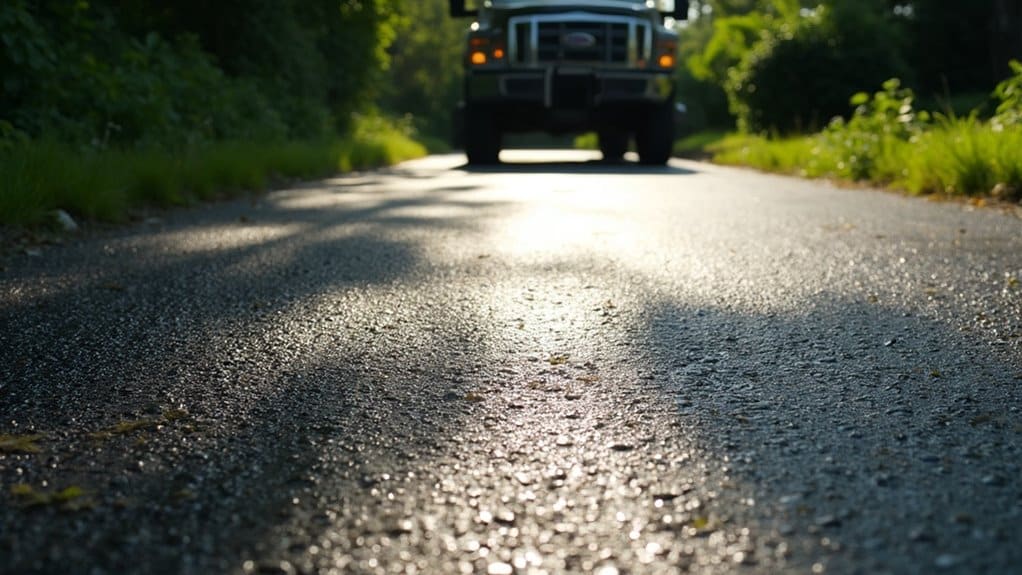When selecting gravel for your driveway, consider options such as pea gravel for excellent drainage and a natural look, crushed stone for durability and long-lasting use, and Jersey Shore gravel for its warm, beachy vibe. River rock provides a smooth, attractive finish, while dense grade gravel offers stability for heavier traffic. Each type has distinct properties suited to various needs and styles, so take the time to find the best option for your project.
Table of Contents
ToggleKey Takeaways
- Crushed Stone is highly durable and stable, making it perfect for driveways with heavy traffic. With proper upkeep, it can last up to 100 years.
- Dense Grade Gravel offers a robust foundation due to its tight compaction, ensuring stability in busy areas with minimal maintenance required.
- Pea Gravel is low-maintenance and cost-effective, providing excellent drainage and a natural look. However, it may need to be topped up occasionally.
- River Rock is visually appealing with its smooth texture and great drainage capabilities, making it a long-lasting option for driveways.
- Jersey Shore Gravel gives a beachy vibe with its rounded stones, but it does require regular maintenance to keep it looking good and functioning well.
Pea Gravel: The Charming Option for Drainage
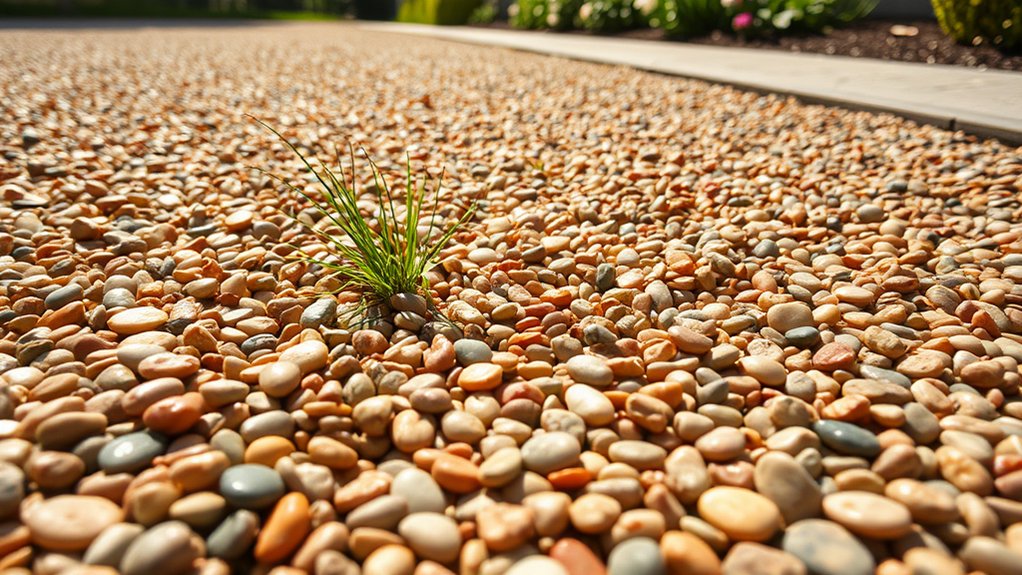
Pea gravel is a charming choice for driveways, especially due to its excellent drainage properties. Its permeability allows rainwater to seep through, preventing puddles and flooding—essential for managing stormwater effectively. The compacted nature of gravel ensures stones stay in place and offers excellent drainage, preventing water pooling. The mix of earthy browns, vibrant reds, and blues adds character to your landscape, enhancing its natural appeal. Additionally, the textured surface of the small stones complements a variety of styles.
Pea gravel is also low maintenance and cost-effective, lasting for years with minimal upkeep. By choosing pea gravel, you’re opting for both functionality and an aesthetic that beautifully harmonises with your outdoor space.
Crushed Stone: A Durable Choice for Long-lasting Driveways
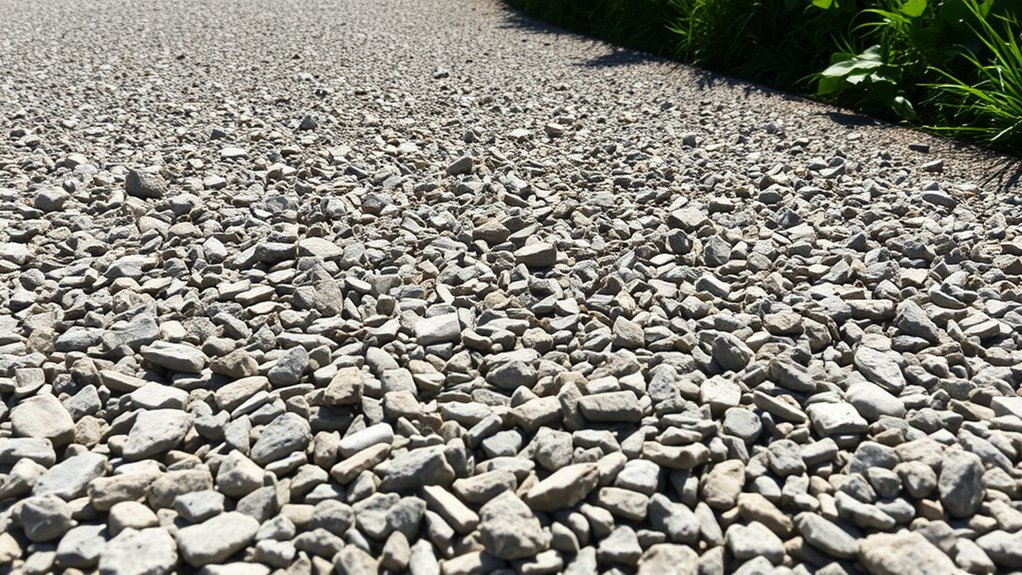
Crushed stone is an excellent choice for driveways if you’re after a durable surface that can handle heavy traffic. Its angular shape interlocks well, offering great stability and resistance to erosion, making it suitable for high-load areas. Although crushed stone is more expensive than standard gravel, its low maintenance and longevity make it a worthwhile investment. Additionally, gravel driveways can last up to 100 years with proper maintenance and care, further enhancing their value. For installation, ensure you create a solid base layer with proper compaction, and consider using geotextile fabric to reduce weed growth. Aim for a specific layer thickness to boost stability. With these tips, you’ll benefit from the aesthetic appeal and durability of crushed stone, turning your driveway into a reliable and attractive feature of your property for years to come.
Jersey Shore Gravel: A Decorative and Functional Solution
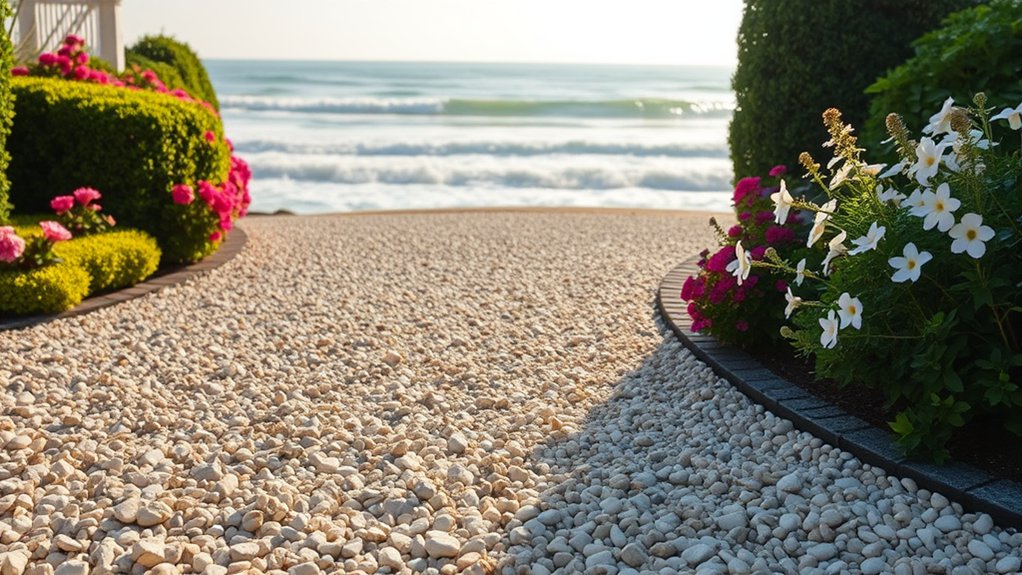
If you’re after a driveway solution that balances aesthetics with practicality, Jersey Shore gravel is a great choice. This gravel features smooth, rounded stones in warm shades of yellow, tan, and brown, giving it a lovely beach-like look. Its excellent drainage properties help prevent water pooling, keeping your driveway functional. Design-wise, it’s flexible and can easily be paired with borders to contain the stones and avoid displacement. Just keep in mind that regular maintenance is key—raking and leveling the surface is important, especially with moderate traffic. While it enhances the charm of your property, you’ll need to replenish the gravel periodically to maintain its appearance and performance. Additionally, frequent maintenance is essential to address any displacement of the gravel caused by weather conditions and traffic.
River Rock: A Visually Appealing Driveway Alternative
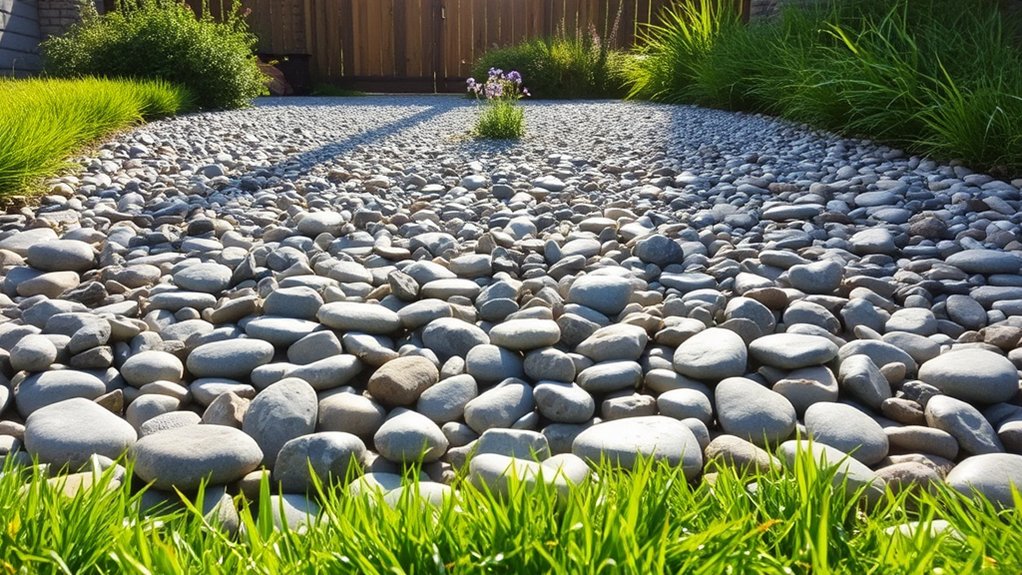
River rock is an attractive choice for driveways, blending functionality with visual appeal. Its natural colours and smooth texture enhance your home’s exterior while providing excellent drainage, preventing water pooling and erosion.
Installing river rock is straightforward, allowing for tailored designs to fit your garden. It’s highly durable, withstanding heavy traffic and harsh weather, and requires minimal maintenance.
This long-lasting option means fewer replacements, making it cost-effective over time. By choosing river rock, you not only boost your property’s appearance but also invest in a sustainable solution that benefits both your driveway and the environment.
Dense Grade Gravel: Stability and Efficiency for Heavy Traffic
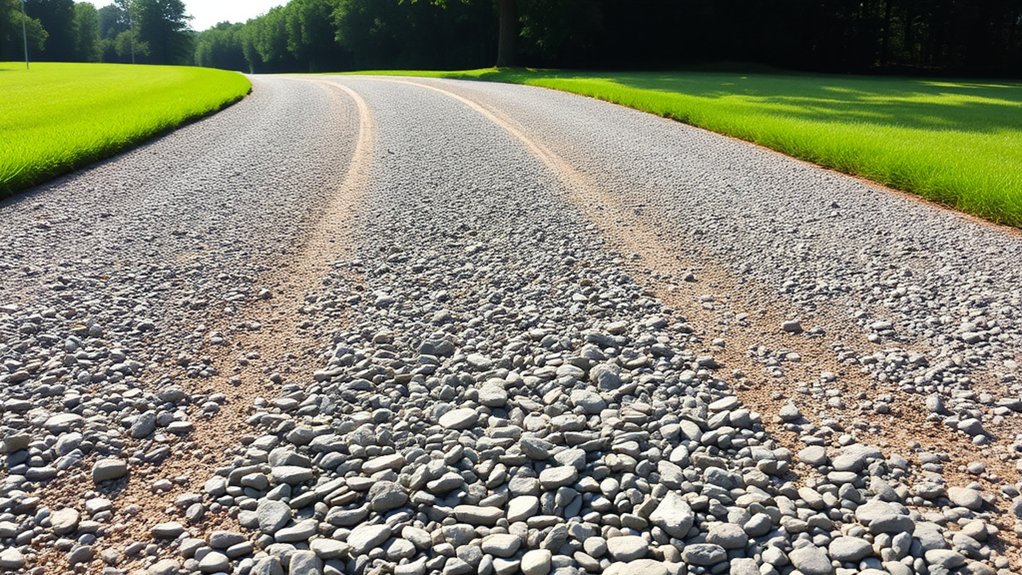
While river rock can look attractive for driveways, Dense Grade gravel is the better choice for stability and efficiency, especially in busy areas. Its angular shape helps it compact well, providing a solid base that can handle heavy loads.
This gravel interlocks tightly, combining larger stones with fine sand, resulting in a durable foundation that resists settling over time.
For installation, a three-layer system, typically 4-6 inches thick, is used, with proper compaction vital for lasting strength.
Dense Grade gravel not only minimises maintenance but also performs exceptionally in demanding situations, making it suitable for both residential and commercial applications.
Frequently Asked Questions
How Do I Properly Install Gravel for My Driveway?
To properly install gravel for your driveway, follow these key steps: level the ground, ensure proper drainage, and compact the layers. This method improves stability and longevity, keeping your driveway functional and looking good. For example, using a rake to level the surface and a compactor to set the gravel can make a significant difference in the final result.
What Is the Best Gravel Type for Snowy Climates?
In snowy conditions, opt for crushed stone or crusher run for the best gravel performance. These types provide stability, durability, and excellent drainage, helping to prevent ice build-up and ensuring a safer surface during harsh winter weather.
Can I Mix Different Types of Gravel for My Driveway?
“Don’t put all your eggs in one basket.” Mixing different types of gravel can improve both the appearance and practicality of your driveway. By combining various textures and colours, you can enhance drainage and stability, resulting in a visually appealing surface that stands the test of time. For instance, using a blend of sharp gravel for stability and rounded gravel for aesthetics can create a functional yet attractive finish.
How Often Should I Replace or Replenish My Gravel?
Regularly check the condition of your gravel driveway. For optimal durability, consider replenishing it once a year, adjusting based on factors like traffic levels, weather, and visible issues such as potholes or thinning areas. Consistent assessments help maintain its functionality.
What Tools Do I Need for Gravel Driveway Maintenance?
“An ounce of prevention is worth a pound of cure.” For proper gravel driveway maintenance, you’ll need some essential tools: a rake, a shovel, a wheelbarrow, and a compactor. These will help keep your driveway smooth, functional, and looking good.
Conclusion
Selecting the right gravel for your driveway is crucial. Each type has its own characteristics. Pea gravel provides a gentle, attractive finish, while crushed stone is strong and durable. Jersey Shore gravel adds a unique touch, river rock is visually appealing, and dense grade gravel offers a sturdy base for heavier vehicles. Think about both the look and functionality you need, and choose gravel that complements your home and lifestyle.
Beneath the surface of tarmac and asphalt driveways lies a world of differences; discover which option suits your needs best.
Choosing between a tarmac and resin driveway can be challenging; discover the key factors that could influence your decision.
Tarmac driveways can support impressive weights, but understanding the key factors will help you determine just how much yours can Read more

